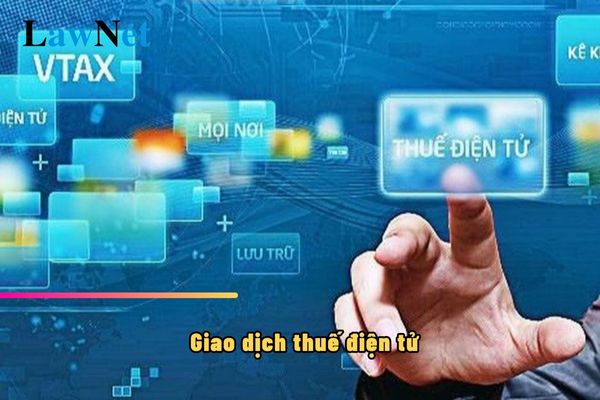May individuals in Vietnam conduct electronic tax transactions?
May individuals in Vietnam conduct electronic tax transactions?
According to Clause 1, Article 3 of Circular 19/2021/TT-BTC, “e-tax transactions” refer to transactions conducted by organizations and individuals by electronic means within the scope of Circular 19/2021/TT-BTC.
Under this regulation, three entities are eligible for electronic tax transactions:
[1] Agencies
[2] Organizations
[3] Individuals
Thus, individuals are one of the entities eligible for electronic tax transactions.

May individuals in Vietnam conduct electronic tax transactions? (Image from the Internet)
What capabilities are required for taxpayers to conduct electronic tax transactions in Vietnam?
According to Clause 1, Article 4 of Circular 19/2021/TT-BTC:
Principles of e-tax transactions
1. Every taxpayer conducting e-tax transactions has the ability to access and use the Internet; has an email address or digital signature under Article 7 of this Circular or a mobile phone number issued by a telecommunications company in Vietnam (in the case of an individual that has yet to be issued a digital certificate) already registered for use in transactions with the tax authority unless the taxpayer pays tax electronically as prescribed in Point dd Clause 2 of this Article under regulations of a bank or IPSP.
2. Taxpayers may conduct e-tax transactions through:
a) The GDT’s web portal.
b) The National Public Service Portal or web portal of the Ministry of Finance connected to the GDT’s web portal.
c) Web portals of other competent authorities (except for those in Point b of this Clause) connected to the GDT’s web portal.
d) T-VAN service providers accepted by GDT to connect with its web portal.
dd) E-payment services of banks or IPSPs for the purpose of e-tax payment.
...
Thus, according to the above regulation, taxpayers must have the following capabilities for electronic tax transactions:
- Access and use the Internet
- Have an email address or a digital signature
- Have a mobile phone number issued by a telecommunications company in Vietnam (in the case of an individual that has yet to be issued a digital certificate) already registered for use in transactions with the tax authority
*Note: unless the taxpayer pays tax electronically under regulations of a bank or IPSP
Where does a taxpayer conducting e-tax transactions through the National Public Service Portal in Vietnam register to use the electronic tax transaction method?
According to Clause 3, Article 4 of Circular 19/2021/TT-BTC:
Principles of e-tax transactions
...
3. An e-tax transaction method shall be registered as follows:
a) Any taxpayer that conducts e-tax transactions through the GDT’s web portal shall register e-tax transactions as prescribed in Article 10 of this Circular.
b) Any taxpayer that conducts e-tax transactions through National Public Service Portal or web portal of the Ministry of Finance connected to the GDT’s web portal shall register e-tax transactions under the guidance of the system administrator.
c) Any taxpayer that conducts e-tax transactions through National Public Service Portal or web portal of the Ministry of Finance connected to the GDT’s web portal shall register e-tax transactions under the guidance of the competent authority.
d) Any taxpayer that conducts e-tax transactions through a T-VAN service provider accepted by GDT to connect with its web portal shall register e-tax transactions as prescribed in Article 42 of this Circular.
Within the same period of time, the taxpayer may only select to register to implement one of the tax administrative procedures specified in Point a Clause 1 Article 1 of this Circular via the GDT’s web portal, National Public Service Portal, web portal of the Ministry of Finance or a T-VAN service provider (except for the case specified in Article 9 of this Circular).
dd) Any taxpayer that selects to pay tax electronically through the e-payment service of a bank or IPSP shall carry out registration under the guidance of such bank or IPSP.
e) Any taxpayer that has registered transactions with the tax authority by electronic means shall conduct transactions with such tax authority according to Clause 1 Article 1 of this Circular by electronic means, except for the cases in Article 9 of this Circular.
Thus, according to the above regulation, any taxpayer that conducts e-tax transactions through the National Public Service Portal or web portal of the Ministry of Finance connected to the GDT’s web portal shall register e-tax transactions under the guidance of the system administrator.

